#sanae hanekoma
Text
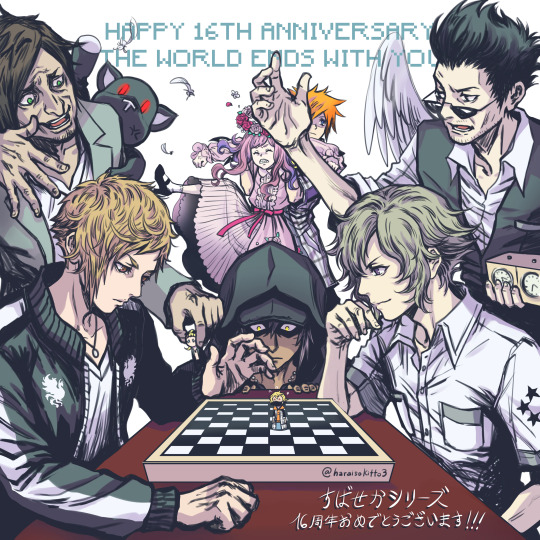
すばらしきこのせかいシリーズ16周年おめでとう!
Happy 16th Anniversary to TWEWY & 2nd Anniversary for Neo! I drew this for a message book project that was delivered to Square today. I'm very grateful for this chance to convey my love to the game staff. This series gave me a lot of inspiration, a true passion project from talented creators that will always be fun and unique even in the future. With or without a sequel, I wish the game staff the best of luck for their future creative endeavors!
The idea of this illustration is "something that will make the creators burst out laughing", which won over my initial idea of drawing something neat and pretty with only Josh xD I'm quite happy with how it turned out, which each of these characters representing how I felt during Neo and how much of a mess I think these higher plane dwellers (plus some sketchy Reapers plotting to intervene and some unwilling human just there to witness it all) make behind the main stage :v
Bonus: Sketch and Lineart.
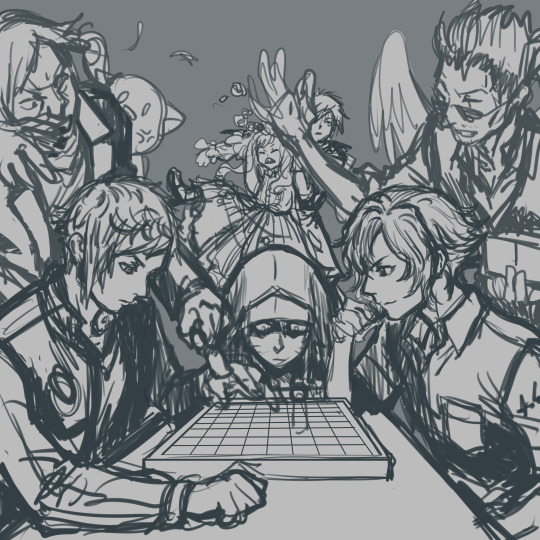
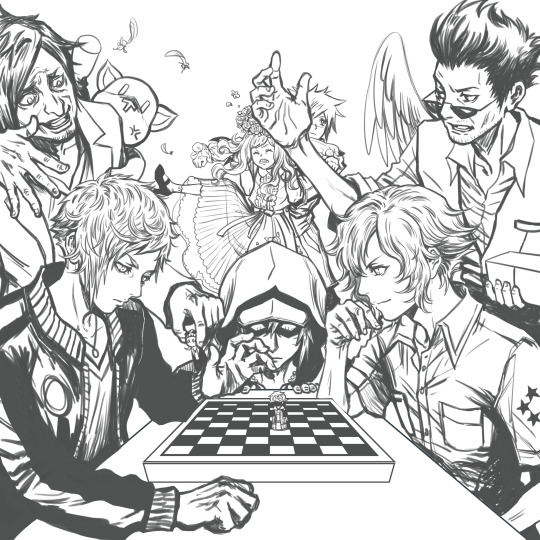
#the world ends with you#twewy#joshua kiryu#neku sakuraba#yoshiya kiryu#neo twewy#neo twewy haz#hazuki mikagi#neo twewy hazuki#neo the world ends with you#twewy hanekoma#sanae hanekoma#neotwewy joshua#neotwewy kubo#coco atarashi#twewy coco#ntwewy#新すばせか2周年#すばせか16周年#TWEWY16th#NTWEWY2nd#subaseka#subarashiki kono sekai#shin subarashiki kono sekai#tanzo kubo#sho minaminoto#twewy sho
521 notes
·
View notes
Text
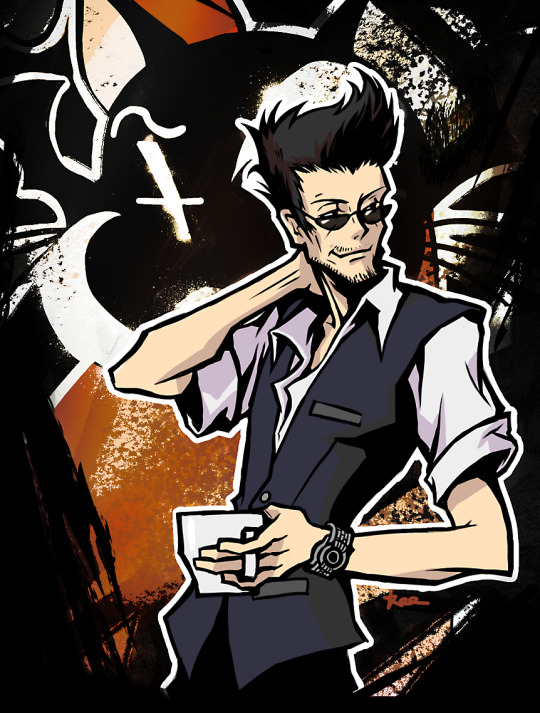
#sanae hanekoma#mr h#my art#fan art#twewy#the world ends with you#isnt it kind of cold how his affection when you go to his shop is at zero#are we strangers mr H?#who were you saving all this time?#show me your friendship items#twewy spoilers
175 notes
·
View notes
Text
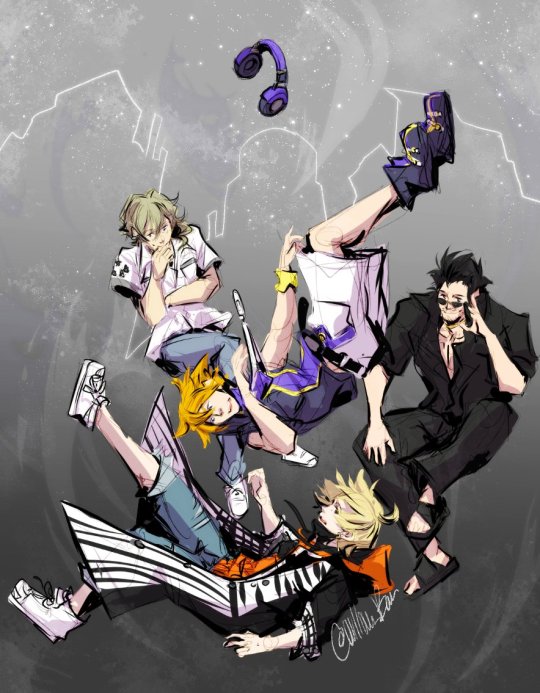
World Is Yours
#❛✰.𝑅𝐸𝐴𝐿𝐺𝑅𝑂𝑈𝑁𝐷)◟⋮ 𝑑𝑟𝑎𝑤𝑛 𝑏𝑦 𝑤𝑖𝑙𝑙𝑜𝑤𝑏𝑢𝑛◞✧ my art.#the world ends with you#neo the world ends with you#TWEWY spoilers#NEO twewy spoilers#neku sakuraba#sakuraba neku#Rindo Kanade#Kanade Rindo#Yoshiya Kiryu#Kiryu Yoshiya#Joshua Kiryu#Kiryu Joshua#Sanae Hanekoma#Hanekoma Sanae#// good luck boys
144 notes
·
View notes
Text
WOKE twewy
neku sakuraBISEXUAL
shiki miSAPPHIC
sanae haneCOMMUNIST
daisukASEXUAL bito
raimu BIGENDER
sho miNONBINARY
JOSHUA KIRYU
#shingetsu online#twewy#the world ends with you#neku sakuraba#shiki misaki#sanae hanekoma#mr h#daisukenojo bito#beat twewy#raimu bito#rhyme twewy#sho minamimoto#minamimoto#joshua kiryu
268 notes
·
View notes
Text
Yeah I'm totally normal about how Mr. H has all the cat symbolism in the first game and is absent in the second and instead of gaitito we have Gatto Nero as the cat brand and it's spoken about in the same fervent praise as CAT work in the first game and Mr. H was the cat because the cat was tricked out of the zodiac but all the reapers are zodiac animals, Mr. H is just his own kind of special step removed, and now in the second game all that imagery is on Shiki. Shiki the not-quite-a-reaper. Shiki the creative pulse of the city. Shiki the guardian.
#SHIKI ACTUALLY TURNED OUT TO BE MR. H'S SUCCESSOR OKAY#THIS MAKES ME VERY EMOTIONAL#the world ends with you#neo the world ends with you#twewy#neo twewy#ntwewy#ntwewy spoilers#shiki misaki#sanae hanekoma
255 notes
·
View notes
Text
There's this aspect of Joshua Kiryu's character arc that I'm sort of flabbergasted to realize might be basically un-analyzed these past 15 or so years. I still kind of expect someone will pop up and point to something they've already written, but i'll talk about it anyway. This might also create some analysis ideas for NEO?? Ideally, anyway.
Essentially, I think it's really likely that Joshua misunderstood way more about his situation with Hanekoma, Minamimoto, and Neku than people tend to think. Not only that, but the idea that he had these misunderstandings kind of colors his relationship with Hanekoma. It also adds to him and Neku being foils. Where do I even begin.
I guess just with this scene that always made me go "hm, that's weird."
Joshua: Think he's got a thing for you, Neku?
Neku: What!? How the hell do you figure that?
Joshua: Oh, please! The way he follows you around?
Neku: That's just because I'm a Player.
Joshua: I don't see him chasing after the other Players.
Neku: (He's right… So why me?)
Joshua: …Or is it my fault?
Neku: (What? That's right… He might be tied in with the Reapers.)
So, what's so weird about this? Am I actually proposing that Joshua really thought Minamimoto was following Neku when he asked this? YES. I AM. That might sound nonsensical, and that's because it kind of is! But there's a reason for that.
When you know what happened in the Udagawa back alley a week and some change prior to that scene, it's reasonable to ask "why would Joshua think a Reaper was after some random RG guy?" Minamimoto came at him with a gun! But then why did Joshua even ask Neku if Minamimoto was following him? If he's trying to trick Neku into thinking this, he wouldn't immediately propose the truth afterwards. Maybe he's trying to make Neku distrust him as he does earlier (Neku scanning him, general sketch behavior perhaps) but not only is that redundant, it still doesn't answer why he asked about Neku in the first place.
So what happens if we take Joshua at face value here? Are we to assume Joshua thought he was the target at Udagawa, but Neku is the target now? I have no idea what the thought process would be behind that. Are we to assume that Joshua thought Neku was the target the whole time?? That still seems illogical, but maybe instead of asking why Neku would be the target, we should shift our focus and ask "why would Joshua think he isn't the target?"
I find that a lot easier to answer because we have Hanekoma. And Joshua thought he did too, basically.
We know from Secret Report 9 that the only person who should know Joshua's RG identity here is Mr. H.
SR 9:
Minamimoto knows the Composer's RG identity (secret even to the Conductor), and has chased him to the Realground. The Fallen Angel may also have supplied him with this information.
Even in this report, it's proposed (by Hanekoma's misdirection) that someone else, some other Angel perhaps, could know Joshua's identity. We know that there isn't another Angel who told Minamimoto this information though. It was just Hanekoma. The only person in the story for Joshua to suspect is Mr. H.
Yet he doesn't. Or, I don't believe he does anyway. Let's take a look at our options.
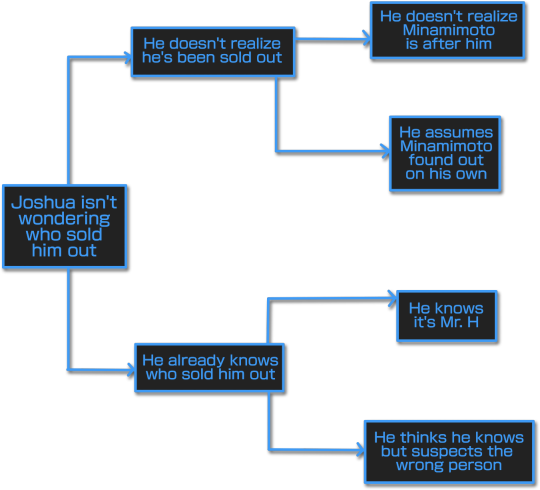
Why does Joshua not seem to be wondering who sold him out? We have two branching options to start with: "He already knows who did it" and "he doesn't realize he's been sold out."
Lots of people assume Joshua already knows Hanekoma revealed his identity to Minamimoto. Because like… how else would he have known? Literally what else is Joshua supposed to think after being shot at? I mean, I've been explaining what else Joshua could have thought, but the point is it's a fair assumption. The only issue is that Joshua doesn't behave like he knows Mr. H betrayed him until Week 2 Day 5.
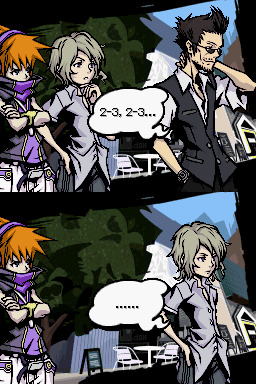
That is a long delay between then and when Joshua should have first known this information (before the story even starts.) I don't know when definitively Joshua put it together, but W2D5 is the first time we can say we KNOW he knows. And it really might have been that moment, because what happens right afterwards?
Well, Neku and him get attacked by Beat and Joshua learns about Kitaniji's "special op." But what happens right after THAT?
Joshua tells Neku that Hanekoma is CAT. An eye for an eye, I guess.
Part of the idea that Joshua did know Mr. H betrayed him from the start is that maybe Joshua was just putting up with that fact. That maybe Hanekoma was too useful, and couldn't do more harm anyway. Or that Joshua really didn't have any other options. I can understand why people think that, but I don't think we can bet on any of those. There's no reason for Joshua to think Hanekoma couldn't do way more harm than just tattling on him, especially as the week goes on and Taboo Noise crop up. Also, while it's impossible to prove one way or the other, there's no reason to think Joshua couldn't have built his game plan sans Hanekoma from the start if he thought he'd betrayed him. All of this assuming that Joshua gives a shit about what Mr. H did, admittedly.
On the other hand, if we posit that Joshua found out later about Mr. H, and that he'd give a shit about that, there should be some kind of change in his behavior towards him. This seems a little hard to to prove because that scene on W2D5 is the last time we see them interact (or even see Mr. H at all) until the ending of the game. That said, it's probably very telling that in TWEWY Mr. H is Joshua's sole confidant, and in NEO Mr. H has no idea what's going on with Joshua at all. I find that very interesting, but we're gonna put a pin in that for later.
Aaaaaaaaaall of that's to say that I don't think it's very likely that Joshua knew Hanekoma told Minamimoto his identity from the start. He shares information with Mr. H too easily for me to think that's the case. What's our next option?
It's possible that Joshua believed he already knew who told Minamimoto, but he was mistaken. However, I said before that there isn't any other suspect in the story and I don't think we can give Joshua another suspect to focus on without just making stuff up. Haz and Coco come to mind as people who might be able to share Joshua's identity, but we can't escape the fact that neither of them even existed at the time Joshua's main character arc was written. We would probably also have to invent some connection they'd have to this particular Game despite them being absent. I think this option is less likely than Joshua knowing about Mr. H the whole time, so I'm striking it off.
What we have left is the "Joshua didn't know he'd been sold out" option. Aside from what I've been arguing, the only other option is "Joshua thought Minamimoto found out on his own somehow." There's no solid reason for Joshua to think this, but it's possible he did anyway. The only reason I think this is less likely than the possibility that he didn't realize Minamimoto was after him is because of how Joshua talked to Neku back there. We have evidence that Joshua might have thought Minamimoto was after someone else; we don't have evidence that Joshua might have thought Minamimoto was able to discover his identity on his own. That said, after the conversation Josh had with Neku W2D2 it's possible his assumption shifted from one to the other as he was trying to figure things out.
So yeah, I believe it's most likely that Joshua didn't realize he'd been sold out at all because that would require him to think Hanekoma would do that to him. Because of that, he believed for more than a week that Neku was Minamimoto's target when they were all in the RG.
You might think that this idea would run into a lot of inconsistencies but I've found it to be shockingly coherent. (Honestly the whole background plot of this game is shockingly coherent for how overt it's themes are. I guess that's beside the point.) Like, let's look at the scene in Udagawa.
It starts with Neku looking up at the tag mural. Then Joshua runs up with a gun from Neku's left. It appears as if Joshua may have been looking behind him. Then Joshua fires in Neku's direction. Neku falls to the ground, but he is unhurt. Then Minamimoto is revealed to be behind Neku with a gun. He is clutching his shoulder. Minamimoto raises his gun, and Neku shields himself. Then several shots are fired towards Joshua. Joshua stops the bullets with his powers, and silently threatens to shoot Minamimoto again. Minamimoto runs off, and Joshua shoots Neku while he is looking after him.
If Joshua already believes that his identity is safe, none of that would clearly contradict that idea to him! Why did Josh think Minamimoto shot at him? Because Joshua already shot Minamimoto. Why was Joshua running if he didn't think Minamimoto was chasing him? To get to his target before the Reaper.
Conversely, why would Joshua be running from Minamimoto if bullets aren't going to hit him?
To us it's obvious that Minamimoto was chasing Joshua and tried to cut him off at the other end of the alley. But to Joshua at the time, he thought Minamimoto was going for the guy in between them.
This does raise some other questions, but there's enough of a case here that I think it's worth speculating off of. Did Joshua even have a theory as to why Minamimoto would be after someone in the RG? Maybe he thought Kitaniji sent one of his Reapers after his potential proxy. Why would it matter to Joshua if Minamimoto killed Neku instead of him if he needs the guy dead? Maybe it has something to do with the fact that Joshua only leaves that extra Player Pin-- his trump card-- on Neku after Minamimoto leaves.
Kind of wild so far, right? Well we're not done because I think this idea that Joshua may have had created ANOTHER oversight for him.
Week 2 Day 7:
Minamimoto: I was hoping for a little reenactment. Same spot, same setup as last time…
Neku: (Last time? Nrrgh! Not now!)
Joshua: You OK, Neku?
Neku: Waaaugh!
[incomplete Neku death cutscene]
Neku: It… it was you?
Joshua: Neku…
Neku: You killed me… You stole my life!
What's with Joshua's reactions here? Did he not realize that Neku was getting headaches around Minamimoto?
(yes)
It's understandable if you think Joshua is faking it here, but if you're with me about this so far you also have to admit that Joshua's surprise can be pretty genuine. I'll be honest, I thought this way before I thought anything else I've put in this essay so far just because Joshua and the situation seemed sincere to me. Why wouldn't Joshua notice this, though?
See, there are four times that Neku, Joshua and Minamimoto are all in the same scene. Neku gets a headache from all of them, and this is what they look like:
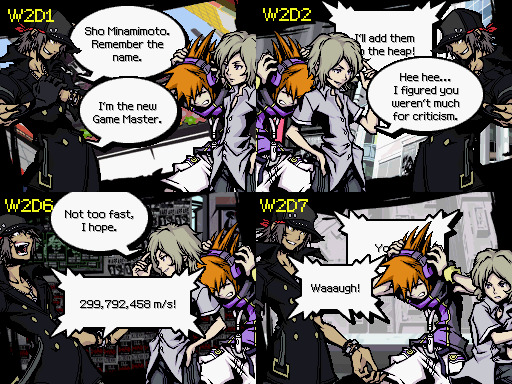
Maybe this is just me, but the sprite direction in all of them but the last one makes it seem like Joshua stays between Neku and Minamimoto, and that he does not take his eyes off of Minamimoto the whole time he's around. And compare day 1 to day 7. Even though Neku's sprite is the one in the middle, he retreats backwards when he gets the headache, giving the suggestion that he's actually sort of behind Joshua. That doesn't happen on day 7 though, meaning Neku is definitely far enough in front that Joshua can see him-- and that's when Joshua finally reacts.
How could Joshua misunderstanding Minamimoto's target contribute to this? Regardless of the misunderstanding here, it's clear to me that Joshua views Minamimoto as enough of a threat that he doesn't even glance at Neku while he's having a memory migraine. But the fact that Joshua does notice on W2D7 seems a little less random if that misunderstanding had cleared up for him and caused him to be less zeroed in on Minamimoto. Keep in mind that these four events split evenly into "before W2D5" and "after W2D5." That means that the first two, Joshua would have thought Neku was the target, and the last two are when Joshua knows he was the target all along.
It makes some sense that Joshua might be so focused on Minamimoto that he doesn't notice what's going on with Neku if he thought Neku was being targeted, but what's going on W2D6? Joshua should know by then it's not Neku that Minamimoto was after. Hell, Minamimoto saved both of them earlier that day so why is he so focused on him then but not the next day? I suspect it's because this was Joshua's first time talking to Minamimoto while knowing he tried to kill him, and he was very absorbed in it.
So on days 1 and 2, Joshua was totally focused on Minamimoto because he viewed him as a threat to his proxy. Day 6 Joshua is focused on Minamimoto but it's not about him being an immediate threat, and on day 7 Minamimoto is at his most dangerous, but Joshua thought he could relax more because he was the target and not Neku.
There is one more thing that might keep this from the list of "Shit Joshua Did Not Know About," and it's the fact that Neku… talks? He talks while he's in migraine pain. Joshua may not spare a glance Neku's way but he can hear. Would that not tip him off earlier than W2D7 if he wasn't just ignoring Neku? Funny that-- the dialogue is actually sort of clever here.
Neku talks a decent amount when he's getting that memory migraine around Minamimoto, but the most suspect lines Neku has aren't spoken by him out loud.
Week 2 Day 2:
Minamimoto: You fractals have no future! QED. Class is dismissed!
[Minamimoto leaves]
Neku: (Finally… The pounding's stopped. What language is that guy speaking?)
Week 2 Day 6:
Neku: !? Zetta…
Neku: (Nrrgh! My head… again…)
[…]
Neku: (The pain's fading… Are he and I connected or something?)
Earlier on (as in the two days Joshua is most focused on Minamimoto as a threat) Neku does also speak out loud about his brain suffering. If Joshua isn't looking at him as well though, they're all things he could interpret as Neku simply complaining about the Weird Math Guy Who Says Confusing Things Through A Megaphone. Neku doesn't like people being loud or people speaking nonsense after all, and uh… Joshua also didn't have the highest opinion of Neku's sociability. Assumptions are a hell of a thing.
So Joshua went into his Game with Neku completely unaware that Hanekoma betrayed him and that Minamimoto was trying to kill him specifically. Then he carried on for nearly the majority of this game without knowing that Minamimoto-- or perhpas the combination of him and Minamimoto-- was giving his proxy debilitating headaches. What does that mean for his character?
Little, but interesting things, I think. I find it pretty compelling that Joshua missed something big about Neku because he was so self-involved even while trying to protect him. It's a neat thing to point at and go "yup, Neku's not the only one who looks stupid for writing people off." I think it also lends well to the idea that they were both getting to know each other in week 2.
Also-- we're coming back to that pin from earlier-- I think it helps flesh out a difference between Neku and Joshua's situations at the end of the game.
Neku: I'm glad I met you guys. You made me… pick up on things, I probably would've just gone on ignoring. Trust your partner… and I do. I can't forgive you, but I trust you.
If you've collected all the secret reports, after Neku's ending monologue and the credits, there's the secret ending. And I feel like the idea of "trust vs. forgiveness" is a palpable element when the ending is viewed as a whole like this. TWEWY doesn't touch upon the idea of forgiveness nearly as much as it does the idea of trust, but I can't help but see a distinction between the two in Joshua just as much as Neku. Only where Neku trusts Joshua but doesn't forgive him yet, Joshua forgives Hanekoma but doesn't trust him yet.
Think about it, doesn't "forgives but does not trust" perfectly describe all of Joshua's future behavior towards Hanekoma? He'll hang around Mr. H in the Room of Reckoning and 104, or talk with him casually about the destruction of a neighboring city. But he wont talk to him if he's upset, or tell him any of his plans anymore. He doesn't seem to hold any of it against Mr. H but he refuses to confide in or rely on him. That turnaround feels really strong if you look at how much Joshua relied on him beforehand. Or if you view his impression of his assassination attempt as contingent on his trust of Mr. H.
The crumbs of information we get about Joshua and Hanekoma's relationship after the betrayal might seem sort of circumstantial. Joshua doesn't want to talk about his feelings for Neku in the secret ending. That carries over into A New Day, and seems to be about Neku. And then in NEO Joshua doesn't give any information to Mr. H for… unknowable NEO plot reasons. But there's something else between og TWEWY and NEO to suggest that Joshua doesn't trust Hanekoma with shit.
A New Day-
Hanekoma (over the phone): If that kid is who I think he is, then he probably doesn't know a thing. If he's who YOU think he is, then he probably won't say a thing.
At first this reads fine because Joshua spent his week with Neku tight lipped and evasive as hell. But still, isn't it a little weird for Mr. H to be saying this? He tells Mr. H stuff, doesn't he? Not anymore! It feels like this Hanekoma is talking pretty universally despite having been the exception. But he doesn't know shit and he doesn't propose he can help them know shit if it's about Joshua. And maybe Coco's fake Shibuya has something to do with that, but it's hard to say.
Honestly, aside from gaining the perspective to not destroy a whole city (important), it's easy to look at this and wonder if Joshua came out of TWEWY worse off. And… yeah, NEO really doesn't seem to help that. But I'm going to end this off with some really vague NEO speculation.
What if it's REALLY just Hanekoma who doesn't know shit about Joshua now? It's probably impossible to know the extent of this, but for some reason Shiki and Beat seem to treat Joshua with a slight sense of familiarity now…? The fandom also (quite reasonably) assumes that the real final day of NEO is the first time Neku has seen Joshua since the final day of TWEWY but we don't actually know that. Some food for thought.
#twewy#the world ends with you#ntwewy#joshua kiryu#twewy analysis#sanae hanekoma#sho minamimoto#neku sakuraba#my theory#idk if this counts more as theory or analysis but i can tag both#twewy meta#<-there thats probably better#scabby.txt
174 notes
·
View notes
Photo

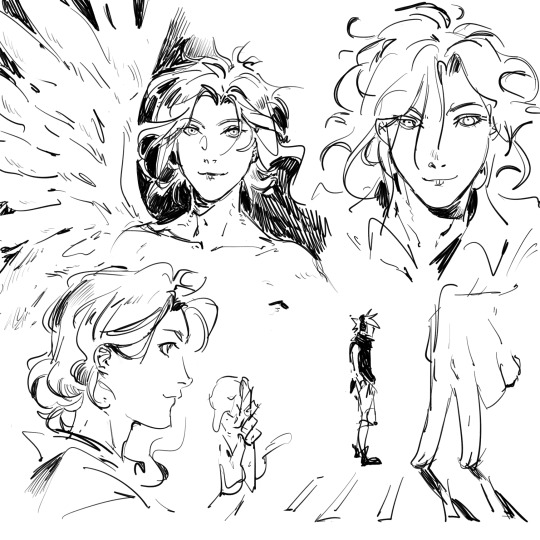

doodles
487 notes
·
View notes
Text
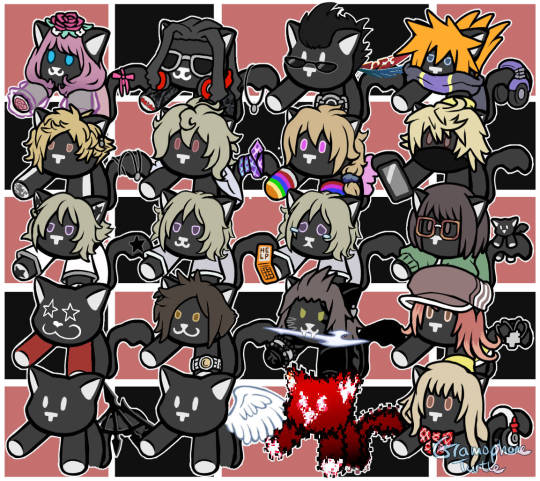
An Order of Mr. Mews, Part 2.
Another seven Mr. Mews requested and created, not eight, because Glitch Mew is special. This Mew is rumoured to have been created by an Angel that tried to recreate the power of Shiki Misaki but could not. (Please try to use traditional methods next time, Angel.)
#twewy#twewy spoilers#ntwewy#ntwewy spoilers#neo the world ends with you#neo the world ends with you spoilers#mr. mew#mr mew#mr mew twewy#mr. mew twewy#coco atarashi#megumi kitaniji#sanae hanekoma#neku sakuraba#hazuki mikagi#yoshiya joshua kiryu#joshua kiryu#yoshiya kiryu#shiki misaki#tanzo kubo#sho minamimoto#eri twewy#tsugumi matsunae#twewy oc#father twewy oc#mother twewy oc#no short story this time. brain not cooperating#my art#my twewy series art
55 notes
·
View notes
Text
Something I always find funny when it comes to TWEWY discussion is how people tend to take Hanekoma’s words at face-value when it comes to the TWEWY mythos and his opinions on the Shinjuku games’ structure and take everything he says as fact when the games show, subtly or not, that he’s a heavily biased source who will outright LIE in the Secret Reports and that he’s not always the right moral viewpoint.
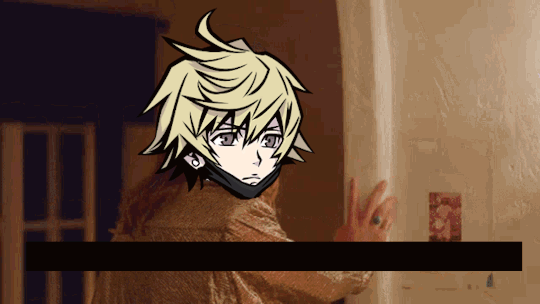
And that’s what I honestly love about his character because like any well-written character, he is often fraught with his own subjectivity.
I think an important thing to note is that in the Secret Reports, there is a small mistranslation that shapes a lot of what Hanekoma has to say regarding the events that takes place within the story; namely, Rindo DOESN’T have a high Imagination. It’s actually rather low or mediocre and his Replay power mainly comes from his pin, with Nagi and Fret being the real powerhouses.
(Shout-outs to my friend ζ for this great document!)
In the original ENG translation, the report went "For better or for worse, he is able to maintain abnormally high levels of Imagination, thereby increasing the accuracy of each Replay."
When in actuality, it’s "The higher [the] levels of Imagination he is able to maintain, [the] increas[ed] accuracy of each Replay." Which basically means that Replay relies on him maintaining the focus of his Imagination, rather than how much Imagination he has in general. It also fits in well what we know about Rindo and how he contrasts his team. Nagi is a huge otaku with a passion for her favorite gacha game, Fret is a fashionista that’s caught up on the latest trends, Shoka has her entire thing with Gatto Nero and Neku and Beat are winners of the last Reaper’s Game, with the former already having high amounts of Imagination even before he got sucked into the game due to a combination of his love for urban culture and the arts and Hanekoma’s graffiti subconsciously raising his Imagination levels even higher. Meanwhile, all Rindo has is the words of a social media guru that he mindlessly parrots and a mobile game that he casually plays. Not exactly grounds for cultivating a high level of Imagination, no? That said, Rindo is still able to function as a potent user of Replay due to his ability to hold a LOT of information in his head at one time, giving him a holistic view of the situation that makes him be able to piece together character relationships and bits of information in a way that he can use to his advantage to turn a bad situation around to his favor. W1D5, W2D2, W3D3, and the final day are especially great examples of this.
This is an important distinction to make because Hanekoma actually dismisses Rindo multiple times due to his low Imagination, in contrast to how supportive he was of Neku in the first game. Hanekoma's prioritization of Imagination is him believing that it is a necessary foundation for people to have in order to face adversity; to interpret their world; to grow, self-analyze, and to properly contribute to society. With that in mind, Rindo not having a good level of Imagination to him is indicative of a kid whose potential to do all these things is not as impressive and therefore would probably fail the Shinjuku Reaper’s Game. And to some extent, he’s right since Rindo does fuck up at times and stagnate when people he believes to be more capable show up to potentially solve his problems for him; taking away his responsibilities from him.
However, Rindo does grow from his mistakes, which ultimately culminates into him rejecting the offer for Haz to solve everything for him in favor of striving for a better future for both him and the people he cares about and the Shinjuku Game’s ruleset does make him come out of his shell as a leader, which was what ultimately saved all of them in the end, not his Imagination levels. It’s important to note that unlike the others, Rindo doesn’t actively participate in Operation Awakening: he’s the guy who gets the pieces to go where they need to go in order to have the operation go by smoothly and navigates them to do their job correctly. Operation Awakening ultimately succeeds due to Rindo’s skill as a leader, which Hanekoma did not view as something to make ado about. Hanekoma's vibe was that imagination, and by proxy, the things it provides a person to do, is something that is predisposed..but Rindo proved that you don't have to be predisposed to imagination to do really amazing things or affect change on a grand scale; you can learn how to do it through your experiences. There’s a reason why World is Yours, which is basically Rindo’s theme, has the phrase "Making mistakes is proof that you’re challenged. The World is Yours."
This is also a pretty big contrast when you consider how the Shibuya Game operated, which was heavily biased towards high Imagination people to excel further while pushing low Imagination people out of the running. I mean think about it: out of a normal week in the original game (Week 1), only Neku and Shiki survived legitimately (Beat only got by due to Hanekoma’s intervention in order to make him a wild card later on). But because they have high Imagination, Hanekoma is fine with such a low survival rate for the others. If someone only cares about supporting the already "gifted", then it makes sense that Hanekoma would only focus on a model that promotes Imagination gain and self-reflection for those he deems worthy, i.e. already have good Imagination.
That’s not even getting into how the nature of psychs and pins already predisposes low Imagination people to be weeded out in the original game. And of course, there’s also this Report from the original to consider.
"So, what happens to those who survive the week? Those whose Imagination is less than outstanding are broken down into Soul, while those with excellent Imagination become Reapers. The most talented of these may travel to the next plane, inhabited by Us Angels."
Remember Sota and Nao? By Hanekoma’s and the Shibuya Game’s logic, those two deserved to be absorbed into Soul by account of them not being able to survive but it’s because how the Game operates, that’s just how it has to be, even though the circumstances were out of their control and they are shown to be genuinely good people. From Hanekoma's view, he sees the act of facilitating Imagination as the means to progress evolution; a way to improve the health of world's laws. And why wouldn't he, right? By focusing on Imagination, you are promoting people to think better, to build self-awareness, to grow and change into better people; to reflect. Hanekoma finds this to be ideal, but maybe doesn't consider the vast ways with which people could achieve high Imagination. Hanekoma essentially viewed the lack of focus on Imagination specifically in the Shinjuku Games as precluding the capacity to grow and change, but failed to account for ways in which the team system could allow for growth and self-reflection in other ways even without an entry fee, and arguably more so because of it. The great thing about Hanekoma as a character is that while he has good intentions, he still falls under the Higher Plane mentality of "the ends justify the means" and this leads to a heavily biased perspective from his end. Just take a look these excerpts from the original game’s secret reports:
"My art is widely accepted in Shibuya."
"This proves that those with Imaginations sufficient to create the future are gathering in the area. Shibuya's future is looking very bright."
"I imbue my art with two command codes. The first is "Enjoy the moment more". This strengthens the Imagination. The proxy received this signal loud and clear, though past trauma precluded him from responding accordingly."
"The second code, "Gather", calls to those with strong Imaginations. Hence the inevitability: why wouldn't the Composer find his worthy proxy standing in front of my graffiti?"
When you break it down, he’s essentially saying "My art is so good that it is propelling Shibuya into a better future. Just ignore how I implant my own codes within it to specifically cultivate Imagination." Sounds just a bit egotistical, doesn’t it?
Shibuya is a hub of youth culture and is where new trends are born. Of course the UG of it would value individuality and creativity -> influencing others through art and passion. Shinjuku is both a business district but also has a very expansive night culture. It’s considered "adult" in comparison so of course the UG would value having to work with many, many different kinds of people -> being able to navigate and work with people to your advantage. This also helps to explain why the concept of entry fees aren’t a thing because the team set-up is the challenge in and of itself. Obviously Shiba’s version of the game is an anomaly so huge teams like that probably wouldn’t exist in a "normal" version of the game.
But being a leader in and of itself puts that individual in the best position to ascend and gain power within the UG, but then the leader is burdened with being in charge of the individuals under them. Meaning they have to learn to balance the two and work with their team. Likewise, just joining a team means you end up at the mercy of just following along with what your leader says, meaning without the ability to actually challenge or discuss things openly, you will also fail as an individual within that team.
Let’s compare Fuya and Kanon’s teams for this example: Fuya is explicitly noted to have a high Imagination but that didn’t stop him or his team from repeatedly coming into second-to-last place and the mental breakdown he’s currently having while Kanon doesn’t have a whole lot yet she has her head on her shoulders and the social skills needed to be an effective leader, hence why she and her team are able to survive relatively comfortably in the middle. Just having high Imagination or high qualities won’t be enough on its own if you’re unable to work together and balance out your respective strengths The Wicked Twisters end up being the best example of this ideal since they’re able to work together and clash thoughtfully as a team and support one another in times of needs, with the final day in particular running entirely on this concept. If just a single piece was out of place, the entire thing would’ve fallen apart.
Ultimately, Rindo’s growth is a response to OG TWEWY in that you don’t need high Imagination or some other equivalent to be able to enact change and that there are other methods to do so, especially if you use your own unique strengths for them.
Then we must compare how the respective Games are operated. The Shibuya Reaper missions (other than the one assigned by Kitaniji) tended to be pretty simple: go here, defeat Noise, etc. The other stuff such as the need to fix 777’s lighting seemed less about intentionally giving a mission and more incidental. They additionally have harrier Reapers, who more or less fit as the game’s RNG element with their job being to actively hunt down Players like animals. With this and giving the Players simple missions with little structure to go on but letting them have to figure out any resultant complications, the Shibuya Game is a lot more chaotic. By contrast, the Shinjuku Reapers are a lot more involved and administrative, which is fitting considering their business aesthetic. You have them being around to answer questions (unless you’re Shoka but she’s had to do this repeating structure for ages without a shake-up of things so it makes sense that she would be sick of it), preventing unfair interference, providing help, and generally ‘administering’ the missions. You have ordered events like the Scramble Slams, with the commentator actively, well, commentating, more involved missions like decals being set up ahead of time, spot-the-difference missions, a pig treasure hunt, etc…
Of course, there are certainly chaotic elements as well (bribing Reapers for more points, having to act on the whims of the Game Masters, teams forming alliances with one another, etc) but for the most part, it’s a much more controlled structure and it really fits in well when you consider the individuality vs sociality mindset of Shibuya and Shinjuku respectively and shows why Hanekoma, an Angel infatuated with Shibuya, would look down on the Shinjuku games in comparison. In his mind, Shibuya’s more emergent mechanics and interactions allow for more Imagination to be cultivated and to him, Imagination is the sole important thing to focus on. But Rindo’s growth disproves that mentality quite a bit and shows that, like many things, there’s room for compromise between both sides. It may also reflect the devs' changing opinions as culture has changed. In 2007 Nomura and company may have focused more on individual talent under the idea of the spirited sole artist, but by 2018, they realized that leadership and followership, and the ability to work in teams, also really fucking matters. Individuality is still important at the end of the day, hence why Rindo needed to get his shit together and not just become a follower like he was before in order to achieve better things for himself and others, but accepting and learning to balance different viewpoints in order to achieve a desired solution is also extremely important.
At the end of the day, Rindo’s growth is a response to OG TWEWY in that you don’t need high Imagination or some other equivalent to be able to enact change and that there are other methods to do so, especially if you use your own unique strengths for them and even Hanekoma himself seems to realize this when he praises Rindo’s ultimate decision and the courage he had to have to make that choice and sincerely hopes to meet him someday.
Ultimately, Rindo’s growth is a response to OG TWEWY in that you don’t need high Imagination or some other equivalent to be able to enact change and that there are other methods to do so, especially if you use your own unique strengths for them. And even Hanekoma himself seems to realize this when he praises Rindo for this courage he had to make his final decision and that he sincerely hopes to meet him someday.
#twewy#the world ends with you#ntwewy#neo twewy#neo the world ends with you#rindo kanade#sanae hanekoma#spoilers#neo twewy spoilers#analysis post
225 notes
·
View notes
Text
Can't believe Hanekoma betrayed Joshua like that, I know he's evil but look at him
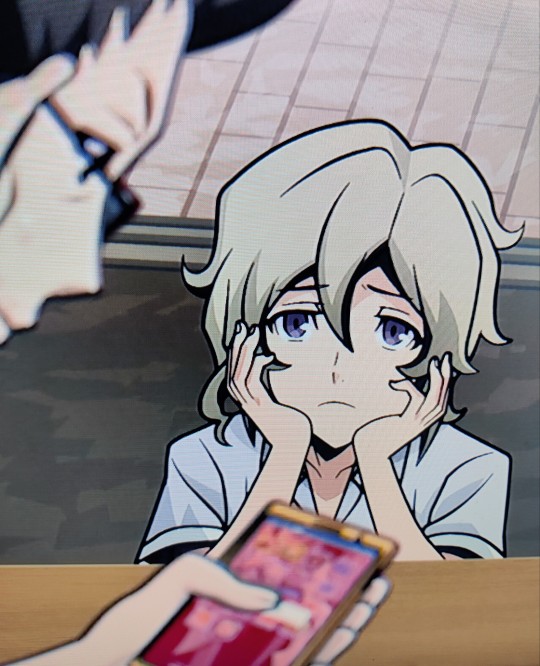
Hanekoma is like: I'm prepared to be punished for what I've done
Joshua is like:
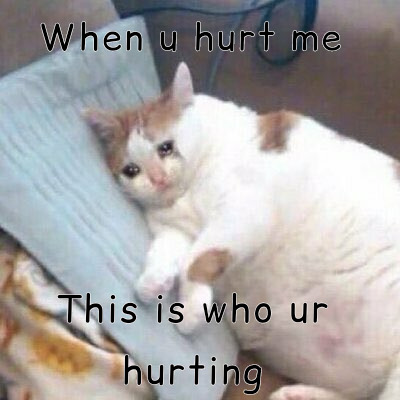
38 notes
·
View notes
Text
Feel free to put your thoughts in the tags >:D
#TWEWY#NEO TWEWY#the world ends with you#neo: the world ends with you#rhyme bito#raimu bito#uzuki yashiro#koki kariya#coco atarashi#sanae hanekoma#kanon tachibana#shiba miyakaze#kaichi susuki#susukichi#tsugumi matsunae#kaie ono#hazuki mikagi#(I’m definitely not biased in the slightest lol)#(That being said Uzuki; Shiba; and Susukichi are my runner-ups and are among my favorite characters in the series)
89 notes
·
View notes
Text
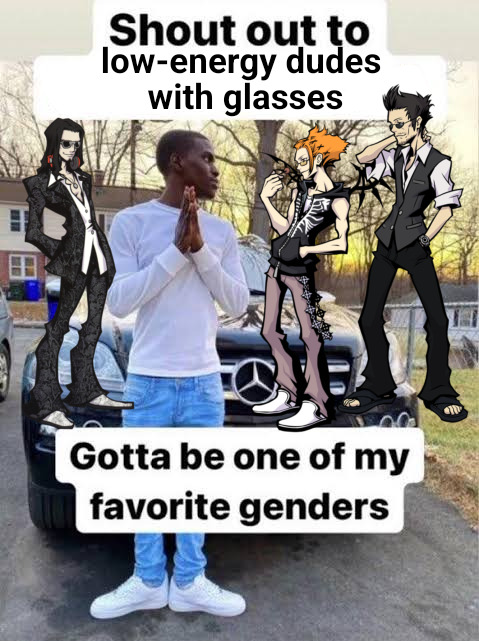
Just realised I didn't post this one. Enjoy some Kerel Lore.
158 notes
·
View notes
Text

You're wearing 2007 Lapin Angelique in 2024???
#❛✰.𝑅𝐸𝐴𝐿𝐺𝑅𝑂𝑈𝑁𝐷)◟⋮ 𝑑𝑟𝑎𝑤𝑛 𝑏𝑦 𝑤𝑖𝑙𝑙𝑜𝑤𝑏𝑢𝑛◞✧ my art.#// in his defense neku hasnt been shopping in literal years#// hes got OG game wardrobe still and hasnt been able to update his clothes#TWEWY spoilers#NEO TWEWY spoilers#the world ends with you spoilers#neo the world ends with you spoilers#neku sakuraba#sakuraba neku#shiki misaki#misaki shiki#joshua kiryu#kiryu joshua#sanae hanekoma#hanekoma sanae
82 notes
·
View notes
Text
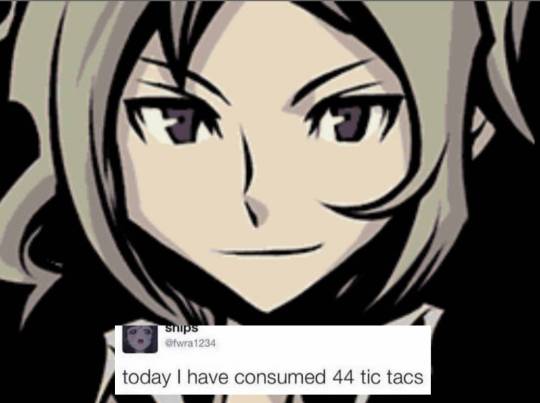
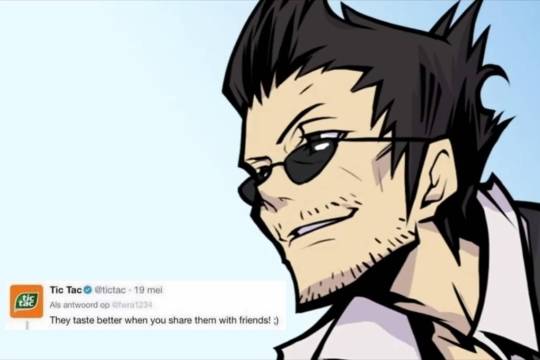

136 notes
·
View notes
Text

Octoling Hanekoma call that Hatakoma
#the world ends with you#twewy#twewy hanekoma#splatoon#octoling#sanae hanekoma#hanekoma sanae#スプラトゥーン#ntwewy#すばらしきこのせかい#neo twewy#neo the world ends with you#splatoon fanart#my art#reaper art
28 notes
·
View notes
